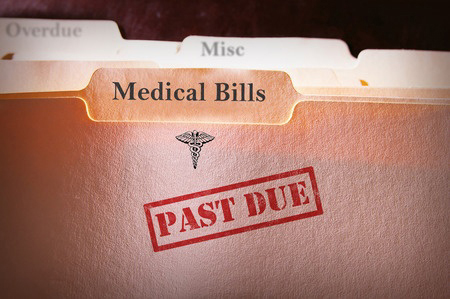Divorce is one of the major causes of bankruptcy. If your divorce agreement includes child support payments, your ex-spouse can play a significant role in determining whether or not your bankruptcy will be discharged.
We recently discussed several aspects of bankruptcy with Christopher Holmes and Jess M. Smith, III, partners at Tom Scott & Associates, P.C. The discussion covered several topics, including the means test, the differences between Chapter 7 and Chapter 13, how divorce and child support can affect bankruptcy, and the discharge process. Below is Part 3 of 4 of the transcript of that conversation.
Q: Have you been dealing with any unusual circumstances recently?
Jess Smith, III: I have a gentleman who completed his Chapter 13 plan; he made all of his payments and was getting ready to file his motion for discharge. However, his ex-wife objected to it because he fell behind—not on his post-petition child support—on his share of the uninsured medical expenses for the child. She had taken him back to the divorce court and got a judgment against him for not paying his share of those medical expenses, which is classified as a domestic support obligation. She objected to his discharge under Chapter 13.
Chris Holmes: Before anyone can get a discharge under Chapter 13, they have to certify they have paid every single penny of child support that came due after the filing of the case up until the day of discharge. In this poor guy’s case, he had paid every single penny of child support, but then because that other expense—which is in the nature of child support—had not been paid, it became an issue. Child support is not just the weekly amount that’s paid, sometimes people are ordered to pay a percentage of medical and dental and optical expenses. Evidently, he didn’t pay his fair share, so she sued him and got a judgment against him.
JS: She filed a contempt on him in the divorce court. She also filed an objective to his bankruptcy discharge.
Q: If he was denied a discharge, would that mean his personal liability on all of those other debts would still be there?
JS: The bankruptcy judge waited to see if he was going to make any headway on it. No resolution was made, so the judge said to the debtor, “Either I’m dismissing this case or you might be able to convert to a Chapter 7 and there might be ramifications of that or not.” So, we converted to a Chapter 7 and we got his discharge. So, all of his other debts were discharged, but he did not get a Chapter 13 discharge, In this case, it was really of no consequence, because he was not paying taxes in the plan.
I’ve got another case in which the debtor had a Chapter 13, with taxes being paid in the plan. He also owed his ex-wife child support and he estimated that he owed her $5000 of child support. So the ex-wife got notice of the bankruptcy and was given a claims form. She never filed a claim. So, eventually the trustee was sitting on this money and he paid the taxes first. Then he said to the debtor, “We’ve got this $5000; you better file a claim for your ex-wife, otherwise I’m going to have to disperse it to Visa and MasterCard, and you won’t receive any child support credit for it.
CH: The ex-wife hadn’t file a claim and if you don’t file a claim you can’t get paid through a Chapter 13 plan.
JS: About a year and a half ago, I filed a claim for the ex-wife and I put the state court divorce number—the Indiana Support Enforcement and Tracking Number. Instead of sending the money directly to the mother, the debtor scheduled a flat $5000 payment and we had it go through the state address where they basically put that money onto a Visa debit card. The trustee pays it through the Indiana Child Support Collection Unit. In the meantime, he’s having his regular support deducted out of his wages. We’re getting close to the plan length, so we tell the debtor that he needs to come in to sign off that he is current. He says, “My kids are 19 and they’re still yanking it out of my check.” I ask, “Are you current or are you not?” So he hired me to find out why they are still taking out child support from his wages. I went to the state court, pulled 17 years worth of records, and did a hand audit. There were periods within those years during which he would miss eight months at a time, and despite the fact that he continued to pay support beyond the child’s 19th birthday, his estimate of what he owed his ex-wife was way low. I created a spreadsheet that accounted for every nickel of child support he ever paid and then told him that he still owes about $5900, even after the recent $5000 payment. I tell him that I can’t file the certification for his Chapter 13 discharge, because it would be a false representation of his bankruptcy. For him to get a Chapter 13 discharge, he has to certify to the bankruptcy court that he has paid all post-filing and all pre-filing child support, unless there was an order in the state court to the contrary stating he doesn’t have to do it.
CH: He has to swear, under the penalties for perjury, that he has paid every single penny of child support from the date of filing to the date of discharge.
JS: The bottom line is I tell him we can’t do this. Meanwhile, the child is 19, so we file a motion to emancipate the child and determine an arrears. There’s a hearing set in June. Basically, I’ve talked to the ex-wife and she said, “I don’t care about the medical expenses, but I want every support payment that’s due. I’m not going to hold up his discharge, but I want my money.” What had happened is when he swore to me that he had paid everything, I filed a motion to terminate his withholding order. His employer received a copy of it, but with no order from the state court they just quit paying the ex-wife. She hasn’t received any money in about four months. But she says, “I want every nickel that is due to me, but I’m not going to hold up his discharge.” I then talked to the bankruptcy court and asked if they had ever had a case like this. They said, "No," and that we should make up a waiver form, have the mother sign it. and the judge will set up a hearing and grant the discharge, because the mother is not objecting to the discharge going through despite the fact that he has not technically complied with the bankruptcy code. If the mother did contest it, just like the other case, the judge would say, "I can’t grant the discharge."
Q: What would have happened if the mother contested the case and forced the judge to actually say, "I can’t grant the discharge."
JS: This particular debtor has only been in the bankruptcy about three years. I would probably put him back into the bankruptcy to stretch the plan out and pay it. But, I don’t want to do that because the trustee charges a fee on the money she collects to disburse to the state, so I’ve got the waiver worked out.
CH: That would be a remedy, if he had the luxury of stretching it out.
JS: If he had more time. We probably have about 16 months left now to delay, but I’m not going to go there.
CH: If it was a five-year plan, we couldn’t extend it. If she objected, the only other option would be to convert to a Chapter 7.
JS: If we converted to a Chapter 7, he would have to deal with some potential past issues in his particular case where he wouldn’t get the same benefits.
CH: Otherwise, he would be out of a bankruptcy without a discharge. So, if he only paid ten cents on the dollar on all of his debt, he would still owe his creditors the remaining 90%, plus interest and whatever late charges are nondischargeable.
JS: They could have closed the case without a discharge. It’s one of those gray areas. There’s no black and white in the code to deal with that issue. We have to kind of make it up as we go and see if the judge will bite on it.
CH: We’ve been doing this a long time. I’ve been doing nothing but bankruptcies since October 1997, when I joined Tom Scott, and Jess started focusing on bankruptcy shortly thereafter. There are attorneys out there who dabble in bankruptcy and there are lots of young lawyers right out of school. I can’t believe that without the experience that there is any way they render as effective legal representation to their clients as we do, because we’ve been there, we’ve done that, and we’ve seen so many strange situations.
In addition, we have the background to relate bankruptcies to other law. There are people who get out of law school now and just go straight into bankruptcy, not knowing how it impacts family law, personal injury, taxation, and other issues. Jess and I are both diversified lawyers. We started out as general practitioners, where we did criminal, divorce, probate, and everything that came through the door—we figured out how to do it.
Part 1 of Conversation: Means Test Helps Determine Filing For Chapter 7 or Chapter 13 Bankruptcy
Part 2 of Conversation: Differences Between Chapter 7 Bankruptcy and Chapter 13 Bankruptcy
Part 4 of Conversation: Being Discharged From Bankruptcy

 When foreclosure of a house is a threat, many homeowners seek debt relief through bankruptcy. A fairly common theme in this type of situation is the presence of a second mortgage. Another common aspect in this scenario is that homeowners are unaware of the second mortgage on their home. How does this happen?
When foreclosure of a house is a threat, many homeowners seek debt relief through bankruptcy. A fairly common theme in this type of situation is the presence of a second mortgage. Another common aspect in this scenario is that homeowners are unaware of the second mortgage on their home. How does this happen?